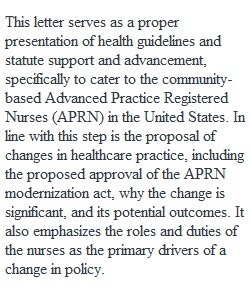


Q Engage Nursing advocacy is the art of influencing others to adopt a specific course of action to solve a societal problem. Advocacy can bring about change. This discussion assignment will provide you with an introduction to the advocacy skills that professional nurses use to address healthcare and social justice issues. Letter writing is an effective advocacy tool that constituents use to voice their opinions about specific issues. For this assignment, your letter should be directed toward a member of Congress. Knowing that reelection depends on the votes of their constituents, Senators and Representatives pay close attention to the mail they receive. Initial Post For this discussion, you will identify a nursing, healthcare, or social justice issue along with related legislation and one of the primary legislators associated with it. You will research your issue and write a letter. Your letter will serve to educate a congressional leader about an issue and explain why you feel they should take action for or against that issue. Receiving a multitude of constituent mail can greatly impact the way a legislator votes on a particular issue. Letter writing campaigns are a useful way to get involved in political activism. By expressing your opinions to your legislators, you are participating in the democratic process, affecting the outcome, and impacting change in healthcare and nursing practice. Steps for Your Initial Post Choose an Issue For this assignment, you need to select a social justice, nursing, or healthcare issue that interests you. It may be an issue you identified in Module 5: The Social Determinants of Health. For this assignment, the issue should be at the national level. For helpful links and information, please see Identifying Issues and Related Legislation. Identify a current bill If you know when the bill will go to committee or to the floor for a vote include that information in your letter. Write Your Discussion Post Write Your Discussion Post as a letter to your Congressperson or Senator. Use the following format to compose your post. The Honorable______________ U.S. Senate Washington, D.C. 20510 (OR) The Honorable______________ U.S. House of Representatives Washington, D.C. 20515 Dear Senator___________: (OR) Dear Representative___________: 1. The first paragraph of the letter should contain your purpose for writing the letter. Your letter should pertain to a specific piece of healthcare or social justice legislation, identified according to its House bill number (HR. 1234) and/or the Senate bill number (S. 952). This way, they know exactly what you're talking about. Provide a link to your chosen bill. 2. Include information that supports your position and how the proposed legislation or issue affects you and your community. Anecdotal evidence is a very effective and persuasive lobbying tool. Information regarding the cost-effectiveness of the legislation is very important. You will need to research to identify the key points you want to include about your issue. Space is limited, so it is okay to use bulleted points to highlight key information. 3. Offer your expertise. As a nurse, you have experiential or academic expertise that may be useful to legislators. 4. Use clear language (within reason). Staff workers in Congressional offices are not experts on healthcare jargon. An example: the term "low blood sugar" may be more understandable than "hypoglycemia." 5. Always ask the senator or representative for something. This can be in support of a certain bill, co-sponsorship of a bill, or you may want the legislator to introduce legislation. 6. Always thank the Senator or Representative for something. You can thank them for their time, their effort or for their support of the legislation. 7. Be courteous, to the point, and try to keep the post to no more than 500 words. Sincerely, Your name and credentials. Response to Classmates Your initial post/letter is due by Thursday at 11:59 PM. Read your classmate's posts and respond to at least two of them by offering support or advice to improve their letters. Your responses are due by Sunday at 11:59 PM. Once you have received feedback on your post, consider actually sending your letter to the congressional leader you identified. You are encouraged to post any reply that you received to the Wrap-Up in Module 7 or Module 8. Become Part of the Democratic Process! Part of advocacy is being a well informed and politically engaged nurse advocate. If you haven't already, registering to vote (Links to an external site.) will allow you to influence issues important to nurses and patients. The ANA maintains a web site that educates nurses on candidates, nursing priorities, voting centers, and ways to get involved: Nurses Vote! (Links to an external site.) Submission Be sure to check your work and correct any spelling or grammatical errors before you post it. When you are ready to post, click on the "Reply" button for a new thread or "Reply" beneath an existing post to respond to the post. Evaluation This discussion will be graded using the discussion board rubric. Please review this rubric below prior to beginning your work to ensure your participation meets the criteria in place for this discussion. All discussions combined are worth 20% of your final course grade.
View Related Questions